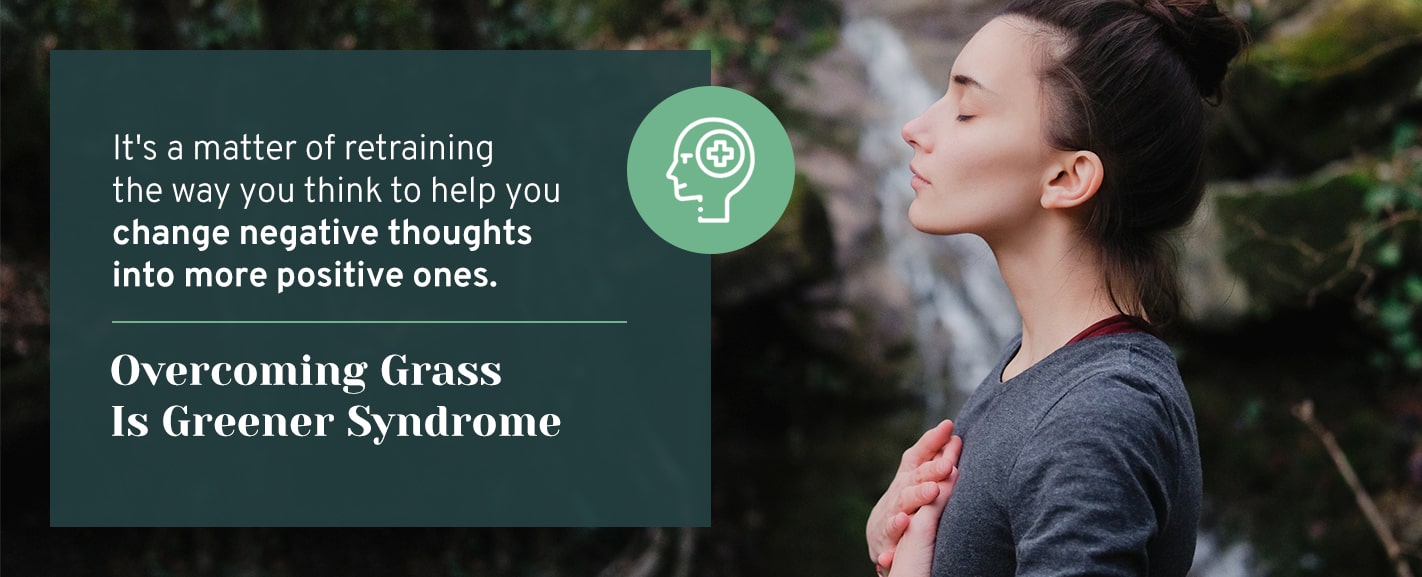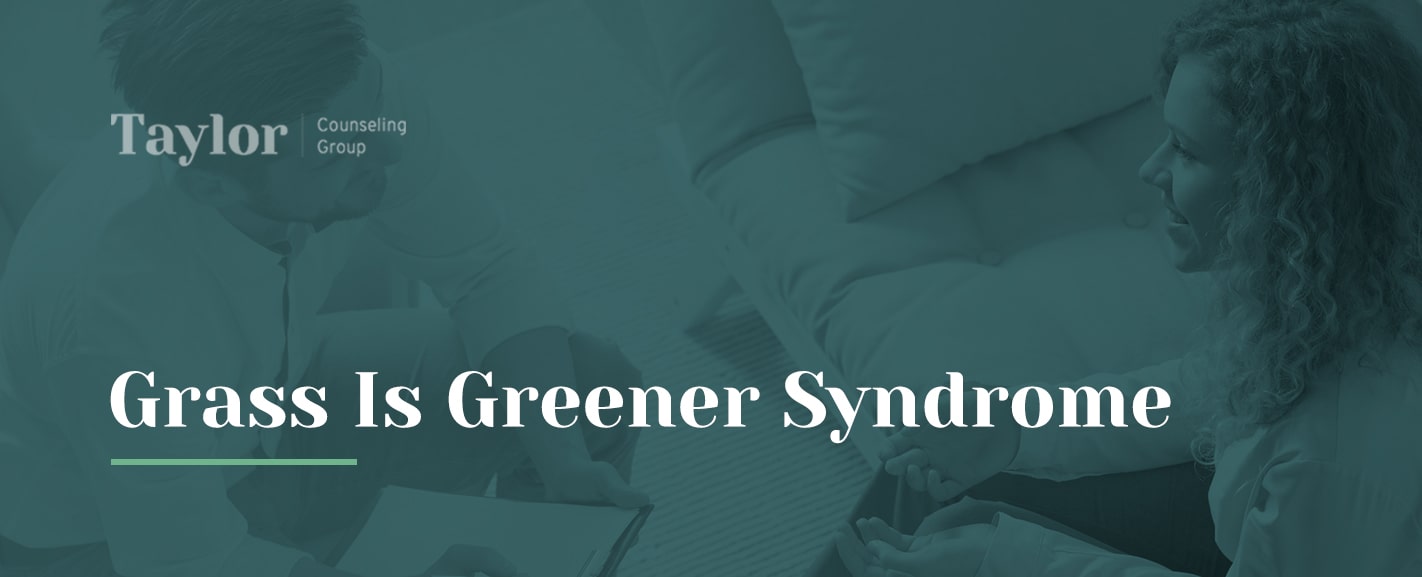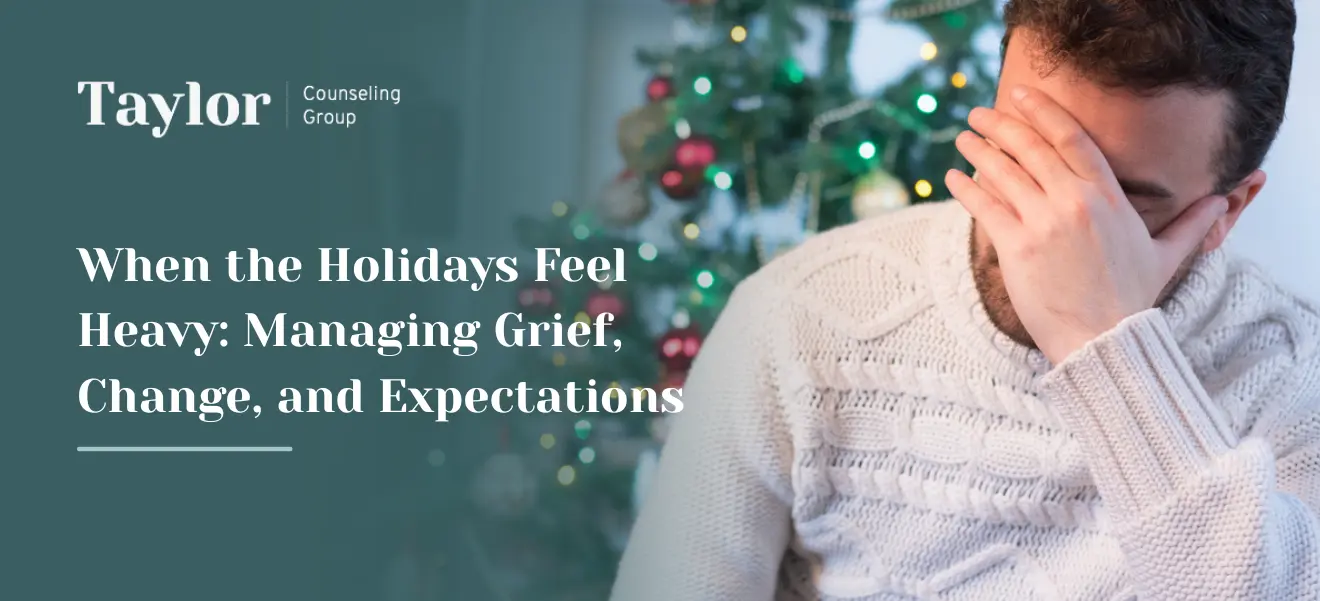If you’ve ever found yourself looking for something better than what you have — even when you seem to have it all, you’re not alone. You may have convinced yourself that everything you have — everything you’ve worked to accomplish and earn — isn’t enough and you need to get more in order to feel satisfied. Or perhaps you see your romantic partner as a place holder until you find “the one” who will give you the satisfaction you feel you’re missing in your current relationship.
While it’s not a designated mental illness, grass is greener syndrome is a way of thinking that can trap you and make it extremely difficult to acknowledge and appreciate the positive around you. It can lead you to jump from one thing to the next, constantly on the lookout for what you’ve convinced yourself is somehow better and, thus, will improve your life. It ends up becoming a vicious cycle because you’re consistently focused on the negative. Even when you obtain the greener grass you sought, you’ll find it’s not good enough and be on the lookout for the even greener grass.
It’s not surprising that grass is greener syndrome can increase the chances of anxiety and depression — after all, there’s nothing fun or enjoyable about being chronically dissatisfied. Luckily, identifying the problem is the very first step to solving it — and it is solvable.
Common Symptoms of Grass Is Greener Syndrome
It can be hard to admit that you need to change the way you see the world, and it can be even harder to know if you’re a victim of grass is greener syndrome. Some common symptoms of grass is greener syndrome include:
- Perfectionism: You’re constantly finding fault with your life and the people in it — from your partner and friends to your job and living situation — you’re seeking something that is practically impossible to achieve: perfection.
- Preoccupation with the future: When you’re preoccupied with how to make your situation better, you’re preoccupied with the future. You’re unable to acknowledge what is happening in the present because you’re too busy obsessing about how it may become better. This removes you from the positivity of your current life, and since the future never comes — it will always be the present — you’re setting yourself up for disappointment.
- Commitment issues: Grass is greener syndrome is most often talked about in relation to romantic relationships. People who live with the syndrome find it difficult to commit to a partner because they’re always convinced that a better match is out there. They’re reluctant to settle down emotionally and may even partake in infidelity while looking for someone better without having to drop their current partner.
- Constant comparison: A surefire sign that you may be suffering from grass is greener syndrome is if you’re constantly comparing yourself and your life with others who have it better in your opinion. Constantly comparing yourself and your situation to others prevents you from existing in the present and acknowledging what you do have in favor of focusing on what you don’t have.
- Frequent need for escape: Running away and fantasizing are both forms of escape common in people who live with grass is greener syndrome. When your own life overwhelms you or your relationship hits a rough patch, and your instinct is to impulsively leave the situation, it may be because you feel the only way to get to the greener grass is to abandon your current project and start fresh.
- Impulsion: When you see an advertisement for a new high-tech gadget, is your first thought that you need to buy it because it will improve your life? If you act on this impulse, it may be another sign that you’re suffering from grass is greener syndrome. You easily give in to impulses, convinced that they will make everything better, even though every previous attempt proved otherwise, and the impulsive items you bought sit collecting dust soon after.
- Ingratitude: Grass is greener syndrome prevents you from acknowledging what you currently have and appreciating it. The inability to be grateful for what you have is only exacerbated by the fact that you’re constantly looking ahead to what you believe will be better. The inability to take stock of what you’ve worked to accomplish and what you currently have is a good way to lead to general anxiety about your life as well as depression.

Overcoming Grass Is Greener Syndrome
The good news is that you can overcome grass is greener syndrome. It begins with recognizing that there is a problem needing a solution. After that, it’s a matter of retraining the way you think to help you change negative thoughts into more positive ones. Here are some ways to start overcoming grass is greener syndrome:
- Get to the root: Understanding how the syndrome developed is an important part of finding the solution that will work best for you. Think through your life — especially your childhood — to see if there is anything there that may have been the cause of you developing the syndrome. Did you feel that nothing you did was good enough? Did you struggle to impress your parents? Do you still struggle to impress them? Do you recall any trauma or neglect that could have impacted you?
- Learn to be grateful: Keeping a gratitude journal is a great way to help you learn to focus on the present and appreciate what you have. Make a list of everything that you have of which you are proud and try to make it things that you are truly proud of and not things that you think you should be proud of.
- Practice mindfulness: Mindfulness practices may not work for everyone, but they’re definitely worth a try because they’re another excellent way to encourage you to focus on what is rather than what isn’t or what could be.
- Talk it out: Seeking professional therapy is one of the best ways to help retrain your brain to overcome grass is greener syndrome. With several types of therapies available, a professional psychotherapist can help you identify the root of the syndrome and work with you to find the best exercises to help you find healthier coping mechanisms.
Get Affordable Therapy With Taylor Counseling Group
At Taylor Counseling Group, we believe that mental health services should be accessible for everyone, which is why we offer affordable, reliable and accessible care to residents across Central Texas.
All of our clinicians are professionally trained to provide superior, reliable service. Plus, we accept most major insurances and offer an affordable care policy for those who may need it.
If you’re ready to take the step to better mental health, book an appointment using our online portal, which is available 24/7.







